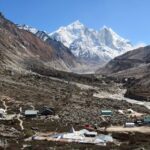Developing countries have been encountered with multiple challenges, including COVID-19, climate change, loss of biodiversity and ecosystem in the past years. These challenges have hampered the development of numerous nations, considering more than half of the global GDP being generated by industries that depend on ecosystem services, such as pollination, water filtration, and raw materials have been seriously impacted. Although nature provides such a significant service, it is generally underestimated and not accounted for in development planning. Therefore, models such as GRID are needed not only to handle COVID-19, but also to focus on inclusiveness, green growth, jobs, infrastructure, and building resilience to climate change and crisis in the event of disasters.
The private sector in Nepal is in dire need of the GRID model for development.
According to the 2020 Global Climate Vulnerability Index, Nepal ranks as the 9th most vulnerable country to climate change with Kathmandu being one of the most polluted cities in the country, causing a rise in socio-economic cost.
The Nepalese financial system is primarily dominated by banks, which invest in brown assets like agriculture, construction, and real estate. As far as the calculation of environmental risks is concerned, their knowledge is limited. It is necessary to protect current investment and the future against environmental and climatic risk through green insurance schemes. Based on the IFC study, USD 46 billion investment opportunities for climate-smart investment is available in Nepal from 2018-2030.
In Nepal, the private sector has increased since the 1990s, thanks to the privatization policy that resulted in over 99% of formal firms being private. With climate change and environmental change, the private sector is confronted with challenges of its own. According to the Department of Road, landslides and floods instigated by the long monsoon season have led to massive harm to the roads with 277 locations and almost two dozen bridges being damaged. An estimate close to NPR 3 billion of damage has to be carried out by the department. Connectivity is a salient factor in the operation and growth of any sector. As far as Nepal is concerned, since there is a lack of sustainable infrastructure connectivity is weak. It is a huge disadvantage for the private sector, especially the ones involved in the tourism and agriculture field, as they are unable to explore attractive places for tourist destinations and transportation of goods from one place to another for agro-processing is met with delays. With GRID’s approach to resilient infrastructure, connectivity, outreach and smooth flow of operations can be developed. The approach could focus on building infrastructure that is resilient to environmental change and resist natural hazards. This would ensure year-round connectivity and reduce the government’s repair costs.
Access to funding is a major constraint for the private sector. Public investment is low and the reliance on immovable assets as collateral is considered weak. Nearly 40% of firms in Nepal consider access to finance as a major constraint. GRID enables access to finance through their investment plan and the mobilization of private capital.
The private sector is also grappling with the institutional gap at the policy level. With the advisory services of GRID, the government can formulate policies regarding loans, development policy operations in the private sector, and sound financial infrastructure. This will further help the private sector in attracting FDI.
Through GRID, the private sector can tap into opportunities available in the forestry sector and diversify its portfolio. The potential for small and medium-sized forest -based enterprises to generate USD 8.7 billion can be a good investment for the private sector.
In terms of tourism and agriculture, Nepal has a competitive advantage because of its unique ecosystem and natural characteristics ranging from tropical forests to alpine meadows. The private sector can capitalize on the climatic condition of the country which is suitable for production of agro-products including high -value niche products such as spices, fruit juices, honey, medicinal herbs, tea, coffee, apples, etc. Furthermore, the private sector can benefit from the unique attractions such as the world’s tallest mountain, serene nature, and important Buddhist and Hindu sites that are located in Nepal. The GRID model for a climate-smart agriculture plan and the promotion of eco-tourism would assist the private sector.
Nepal leads the way in hydropower.
Hydropower can be a source of new investment with the help of GRID in the formulation of investment policy, making it more attractive to the private sector.
It can increase the inflow of resources to boost construction and urbanization. Electricity is an essential pre-requisite for the development of the private sector. Through the private sector, surplus energy can be supplied to a neighboring country, India, which is currently suffering from a power crisis.
GRID’s approach is to manage risk and development through a deliberate proactive recovery strategy for long-term green growth, climate action, and sustainable development for all. This would allow Nepal to deal with climate change, natural hazards, pollution, the pandemic in a controlled manner. Climate change impact can be felt with the recent unexpected autumn rains destroying the paddy cultivation at the time of harvest, damaging farmers’ livelihood. The need for a GRID model is ever-growing, especially for the recovery of the private sector. The sustainable development of GRID infrastructure protects the private sector from uncertainty caused by natural resource degradation and financial shocks. It also creates new investment opportunities for the private sector that help them diversify their portfolio. These investment opportunities, when capitalized, create green jobs for people leading the country towards sustainable growth.
Pragati Karki is a recent BBA graduate of the School of Business of the University of Kathmandu (KUSOM) with a major in finance. Her interests include financial analysis, risk assessment and accounting. Currently, she is working as beed fellow at beed management.





